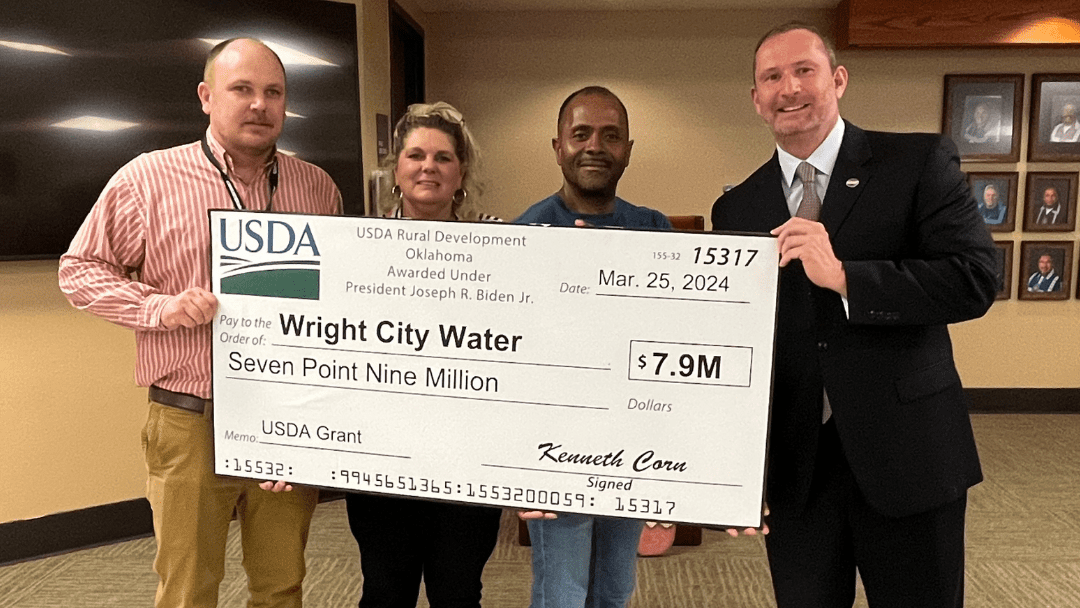Wright City, Oklahoma, once a thriving timber industry hub, faced economic distress following the closure of its primary employer in 2009. The loss of jobs and income strained the town’s finances, hindering efforts to address the deteriorating water system despite rate hikes.
Sourcing water from Broken Bow Public Works Authority, drawing from Broken Bow Lake, the Wright City Public Works Authority (WCPWA) faced a significant challenge. Despite purchasing 94,000 gallons daily and selling only 42,000, the system suffered a staggering 56% water loss. Predominantly iron piping and a lack of isolation valves exacerbated the issue, leading to high maintenance costs and town-wide water shutdowns for repairs.
The WCPWA encountered substantial financial limitations due to higher rates compared to similar systems, rendering them unable to assume any debt at that time.
To address these challenges, the WCPWA, with assistance from the Communities Unlimited (CU) Infrastructure Team, conducted an engineering assessment to identify needs and estimate improvement costs. Subsequently, the WCPWA sought funding from the United States Department of Agriculture-Rural Development (USDA-RD) to revamp water lines and critical infrastructure.

In August and September 2023, the system received two USDA-RD Native American Set-Aside grants totaling $7.9 million. This substantial funding enabled major infrastructure enhancements for residents, with each grant amounting to nearly $4 million. Both grants were specifically allocated to tackle water and wastewater challenges.
With the addition of new water lines, gate valves, fire hydrants, chlorine booster stations, and an aeration pump aimed at reducing disinfection by-products in the water storage facility, WCPWA is poised to have essentially brand-new infrastructure implemented.
“These two grants will be pivotal for Wright City. For one on the water system, it’s going to cut down on that loss. They are spending all that money purchasing that water which is being lost in the ground that they aren’t recovering any money on. I’m excited for them and their enthusiasm about making these infrastructure improvements. From the mayor to the city clerk, Wright City goes above and beyond to keep that town relevant.”
— Lucas Guinn, Community Environmental Management Advisor, CU
CU’s support with Wright City, Oklahoma extends to establishing management policies and procedures for construction, ensuring compliance with procurement laws. Furthermore, CU assists in developing a multi-year budget for assessing and adjusting rates.
Securing the two USDA-RD Native American Set-Aside grants also allows Wright City to make crucial improvements without burdening low-income customers. To add context, the median household income in Wright City is $32,386. The town’s 60% minority population, primarily members of the Choctaw Nation of Oklahoma, emphasizes the importance of equitable access to enhanced water infrastructure.
“We believe we would not have been successful in securing the USDA RD financing without the assistance provided to us at no cost. Our community is grateful to the knowledgeable and dedicated individuals who provide these services through Communities Unlimited. The Town of Wright City does not have the financial means with which to pay for this level of expertise provided by private consultants."
— Brenda Dancer, Town Clerk, Wright City
“It’s very important for us to know that Communities Unlimited staff will continue to assist us in the future as the need arises.”
While Wright City’s water system is still on the path to sustainability, the acquisition of two grants marks a significant step forward. Guinn attributes the initial progress in Wright City to a collective effort, highlighting the leadership of Gaylene Riley, the Oklahoma State Coordinator, and her deep understanding of the area.
As infrastructure improvements in Wright City gear up for 2025, Guinn remains committed to ongoing efforts in the interim.
He’s actively involved in updating Wright City’s emergency response plans and vulnerability assessments, staying prepared for any unforeseen needs that may arise. When the time comes, Guinn and the CU Oklahoma Infrastructure Team will be on standby to lend their assistance.
“My passion to help Wright City comes from their passion,” Guinn said. “They have a willingness to make things happen. I can’t do the work, and neither can anybody on our team here in Oklahoma do the work without help from the officials and the city itself. The information they provide us is what drives us to do what we do.”

